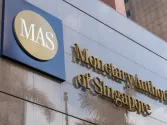
Expected gov’t support to prop up the Industrial Bank of Korea’s solvency: analyst
Exposure to the property sector remains small and does not pose material risk.
The Industrial Bank of Korea’s (IBK) is expected to experience “moderate pressure” that will weigh on asset quality and profitability over the next 12 -18 months, but government support should prop up its solvency.
In its latest ratings commentary of IBK, Moody Investors Service outlined expectations that the government’s de facto guarantee for IBK’s solvency will remain unchanged.
This is due to the government’s majority ownership of the bank, the IBK Act that dictates the government’s de facto deficiency guarantee of the bank, and IBK’s position in supporting South Korea’s small and medium-sized enterprises (SMEs), new industries, and the high-tech sector.
IBK's problem loans to gross loans ratio is forecasted to rise to 1.3%-1.5% over the next 12-18 months, from 1.15% in September 2023.
ALSO READ: South Korea’s interest rates for new deposits, loans fall in January
“IBK's asset quality benefits from its loan granularity, with no significant sector concentration, and the collaterals or guarantees that cover over 80% of its SME loans,” Moody’s added.
IBK’s real estate project financing accounts for less than 1% of its gross loans, consisting only of senior tranches. It is not expected to pose material risk, Moody’s said.
The bank's loans to the construction sector and real estate and services accounted for 3% and 14%, respectively, of total SME loans as of the end of 2023.
Moody's further expects IBK's funding and liquidity to remain largely stable over the next 12-18 months, with a high funding reliance on the Small and Medium Industry Financing (SMIF) bonds.






















 Advertise
Advertise








